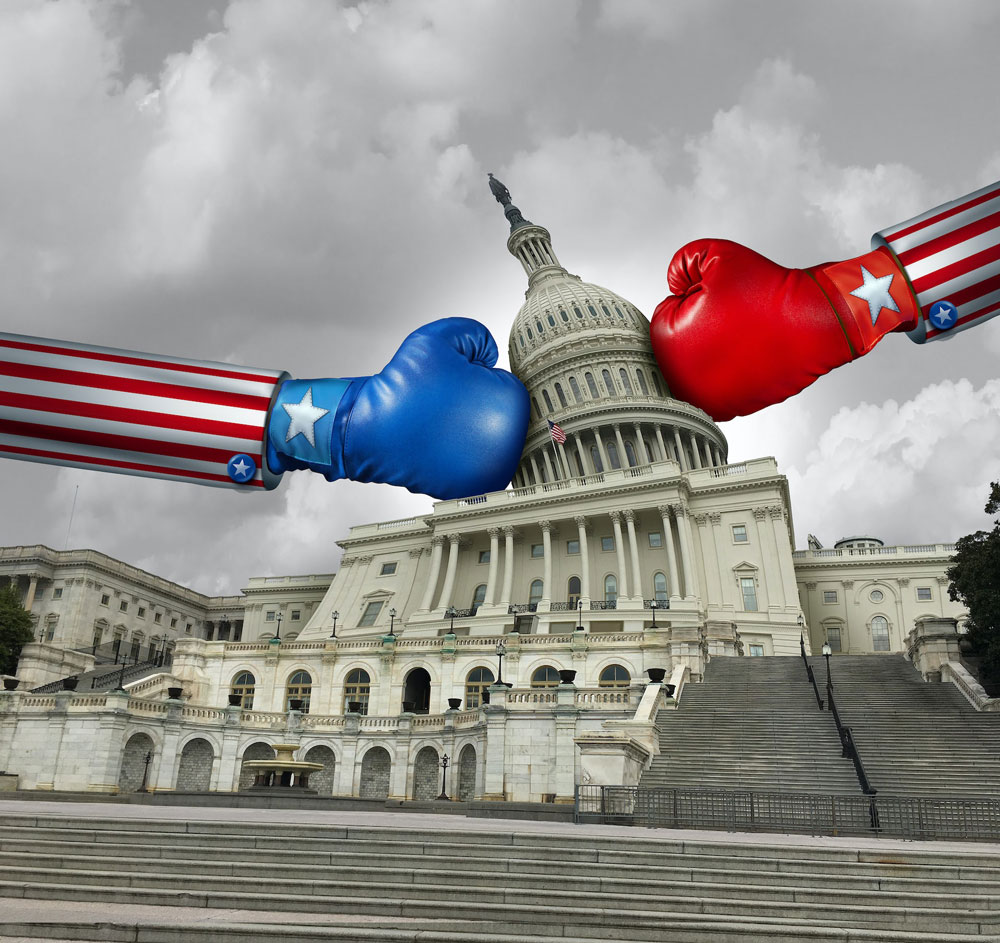
By Laurel Harbridge-Yong
Much of the news coverage of the discussions and negotiations aimed at averting a government shutdown on Nov. 17, 2023, relies on pundits and their unnamed sources, on leaks, speculation, wishful thinking and maybe even the reading of tea leaves. The Conversation tapped an expert on congressional behavior, Northwestern University political scientist Laurel Harbridge-Yong, and asked her what she sees when she looks at the prolonged trouble Congress has had over the past few years coming to agreement on the debt ceiling and spending to keep the government open. Harbridge-Yong is a specialist in partisan conflict and the lack of bipartisan agreement in American politics, so her expertise is tailor-made for the moment.
What do the repeated and difficult debt limit and budget negotiations in Congress look like to you?
The problems that Congress and the White House are having in reaching compromises highlight two aspects of contemporary politics. The first: Since the 1970s, both the House and Senate have become much more polarized. Members of the two parties are more unified internally and further apart from the opposing party. You don’t have the overlap between parties now that existed 50 years ago.
Even as the U.S. has experienced rising polarization, there are still important differences within the parties. Not every Democrat is the same as another and not every Republican is the same.
This relates to a second point: Members’ individual and collective interests shape their behavior. For Republicans in more competitive districts, their own individual electoral interests probably say, “Let’s cut a deal. Let’s not risk a default on the debt or a government shutdown that the Republicans get blamed for, and which is going to run really poorly in my district.”

Drew Angerer/Getty Images
On the other hand, House Freedom Caucus Republicans come from really safe districts, and they care more about their primary elections than they do their general elections. So their own electoral interests say, “Stand firm, fight till the bitter end, try to force the hand of the president.”
These kinds of electoral interests occur at the individual and collective levels for members of a party. Since the 1990s, there’s been a lot more competition for majority control, and as a result the two parties don’t want to do something that gives the other party a win in the eyes of the voter.
So you now have many Republicans who are more willing to fight quite hard against the Democrats because they don’t want to give a win to Biden. This is most evident among the most conservative wing of the party, which has both individual and collective reasons to oppose a compromise. The far-right wing recently showed its power over the party, both through ousting former Speaker Kevin McCarthy – in large part for his willingness to broker deals and compromise with Democrats – and influencing the selection of the new speaker, Mike Johnson.
Johnson may be less willing to broker compromises with the Democrats because of his own preferences and because he needs to maintain the support of the far-right members in his party. Beyond the far-right wing of the party, other conservative Republicans might also believe that insisting on major spending cuts and concessions from the Democrats will boost the electoral fortunes of their party.
Democrats are also resistant to compromising, both because they don’t want to gut programs that they put in place and also because they don’t want to make this look like a win for Republicans, who have been able to play chicken and get what they wanted.
These dynamics, layered on top of policy interests, all contribute to the problems that we’re seeing now.
What has been the role of brinkmanship in these conflicts?
When I think of brinkmanship, I’m thinking about negotiating tactics that push things until the very last minute to try to secure the most concessions for your side. During the May 2023 version of these negotiations, that meant coming to the edge of potential default on the debt. This fall, Congress passed a short-term funding bill with only hours to spare before the government shut down. Now, it faces the next deadline to fund the government by November 17.
Does brinkmanship work?
I was looking back at some of the previous government shutdowns as well as debt ceiling negotiations. In some instances, concessions by the other side were granted, so brinkmanship paid off. In other instances it was less obvious that there was a win, and in some instances there was perhaps a penalty, when the parties couldn’t agree and there was a government shutdown.
One party may be banking on the fact that the other party’s going to get blamed by the public while their own party reputation won’t be hurt. In the 1990s, it seemed as though it was the Republicans who took the brunt of the blame for a government shutdown.
There have been instances in which parties get something out of brinkmanship, as in the government shutdown at the beginning of the Trump administration over funding for the border wall. The Democrats ended up giving some money for the border wall. It wasn’t all of what Trump wanted, but it was part of what Trump and the Republicans wanted.
Brinkmanship and gridlock are disproportionately consequential for Democrats, who generally want to expand government programs, versus for Republicans, who tend to want to constrict government programs. So gridlock or forced spending cuts are easier for Republicans to stomach than Democrats. It may be part of why we see Republicans, especially on the far right, going harder on this kind of brinkmanship.

AP Photo/Alex Brandon
How does the public see brinkmanship?
On the whole, I think the public doesn’t like it.
My own work has shown that the public does not like gridlock on issues in which people agree on the end goal. The public, on average, even prefers a victory for the other side over policy gridlock.
A win for their own side is the best outcome, a compromise is next best, a win for the other side is next best after that. Gridlock is the worst outcome.
The place where it gets a little bit more challenging is that how people understand and interpret politics is heavily shaped by how politics is framed to them.
Looking back at the debt ceiling negotiations: Conservative politicians and media spun the issue very much as a fiscal responsibility question, saying it was just like a family’s personal budget at home or that it was really important to not just raise the debt limit without spending concessions.
Those on the Democratic side heard that the Republicans were holding the country hostage, that we can’t give in to them, this will gut really important programs, and so forth.
So on the one hand, the public doesn’t like gridlock – especially gridlock when the consequences are so bad, as default or a shutdown would be. On the other hand, voters in each party’s base hear the issues framed in very different ways. Both sides may end up blaming the other side. They’re not necessarily going to be calling their legislators and asking them to compromise.
Democracy is about representation. As they conduct negotiations, do lawmakers see themselves as representing voters?
Many conservative Republicans who hold firm in budget negotiations may believe that they are good representatives of what the base wants. In the recent book that I wrote with Sarah Anderson and Daniel Butler, we found that legislators of both parties believe their primary voters want them to reject compromises.
But in today’s conflicts, those constituents may not really understand the consequences. Sometimes good representation doesn’t just mean doing what the public wants – legislators have better information or understanding of how things work and should do what’s in the best interests of their constituents.
However, even if individual members think they’re representing their constituents, representation at the aggregate level can be poor.
What the public as a whole – which tends to be more moderate – wants is compromise and resolution.
This story is an updated version of a story originally published on May 26, 2023.
(*) 756
![]()
Laurel Harbridge-Yong is Associate Professor of Political Science, Northwestern University





























Marti G. says
If our congress cannot figure out how to avoid a government shut-down, they should be the first to have their pay stopped! They are responsible for approving budgets, allotments, etc. In the real world of business, they would be fired for not fixing the problem! Why should others who protect this country, air-traffic controllers, etc. suffer for their inability to do the job they were elected to do.
This is a disgrace!!
joe says
It’s not “our Congress” that’s the problem……it’s the extremist Republicans bent on sabotaging Biden no matter the cost and continuing their decades-long fight to cut Social Security and any other programs that benefit middle class folks….only tax cuts for the wealthy matter to them.
Dennis C Rathsam says
America can not continue to spend monies they dont have! Its time to put an end to Biden spending money like a drunkin sailor. We give money to how many countrys? Some that hate us! Its time to help Americans, & thier families.
JimboXYZ says
Funding the Gaza Crisis & Ukraine War, a Government Shutdown falls on deaf ears for crying that there is no money. Finding those billions for everything but avoiding a Government Shutdown, anyone else Bidenomicing this ?
Another Concerned Taxpayer !!! says
I agree that the Congress should be the 1st to have their pay stopped with no retroactive pay once they finally approve the budget. As it is now, they really face no penalty for not doing their jobs, they are all wealthy and the electorate appears to have very short memories. I also suspect that there is a certain faction that wants a government shutdown, that a certain ex-President wants that shutdown to tank the economy even more than it already appears, as he believes it will help him get re-elected. He has already proven that he will do everything and anything to get re-elected. Additionally, he is in essence by proxy, the Speaker of the House, pulling the strings of his puppets to do his bidding. Helping him seek revenge on all of those that he feels are his enemies or have slighted him in some manner.
Laurel says
Another: Trump has pledged to go after those who disagree with him if he is elected. He has no American values.
Joe D says
This whole government shutdown(s) process REEKS of MIDDLE SCHOOL!
I know there are issues about excessive government spending, and we cannot continue to CONSISTENTLY spend more money that we have. However to fund the government MOSTLY on the backs of the Middle Class and Blue Collar workers, is highly unfair, while Billionaires pay a lower level of tax payments.
Republicans RAGE against the Government DEBT level caused by “Democratic overspending,” but the FACTS are former President Trump with his fancy TAX cuts ( with no plan on how it was to be paid for), which are due to expire in ?2025 ( currently Republicans in Congress are TRYING to make them PERMANENT) were MOSTLY cuts on taxpayers making OVER $685,000, added much more to the National Debt, than Biden’s spending bills, aimed at middle and lower income citizens. Biden had a proposal to re-instate a tax rate closer to ?20% for corporations (not the approximate ? 10% tax currently)….most of us out there are paying 22%-28% on their income, why should Millionaires and Billionaires get SIGNIFICANT tax benefits not available to the “average Joe’s?”
Biden’s budget proposal was tied to increasing the corporate tax rate AND the top 2% of income earners….to cut the deficit by Trillions, extend Social Security solvency into the foreseeable future AND still provide services to the most vulnerable of our society ….it was fought tooth and nail by Republicans in Congress, and didn’t pass.
Now we stand at the edge of yet ANOTHER government shut down, in a few days…..and some extreme Republicans are AGREEING to a shutdown to make the BIDEN administration look bad. What it does have, is the potential to worsen our country’s current AAA+ borrowing credit rating….costing us even MORE to borrow ANY money….not to mention the disruption another shutdown would cause to government contractors and others who WON’T get reimbursed for lost time during a shutdown.
This looks like a very SAD version of “playing chicken”…with people’s lives
The dude says
Make it so congress doesn’t get their pay and benefits, and the SS checks don’t go out if the US government shuts down.
That will get the voting public’s attention.
There will never be another rightwing performative jackassery government shutdown again… ever.
Atwp says
Caucasion males. Look at the government almost full of immature white males that don’t care about nobody but themselves. Caucasion males are the worst leaders of all times. What a pity.
Dave says
Shut it down, lets just freaking do it and let the chips fall where they may. Left, right middle, who cares, our Congress just keeps on screwing around doing actually nothing for the last 10 years’ as ego’s flourished and their members popularity contest took off. I think the majority of americans would rather just have these congressional members just do their darn jobs like we elected them to do and meet in the middle and work. .
Pogo says
@Joe D, The dude
Right you are.
While time is running out for the entire planet: people who know better are gnashing their teeth and rending their cloaks about personal grievances, revenge, a fatally flawed triage of life-threatening problems, and biting president Biden’s ankles while he bears the weight of the world for ungrateful asses and is challenged by kooks like RFK Jr, and Jill Stein too.
We are well, and truly, fucked.